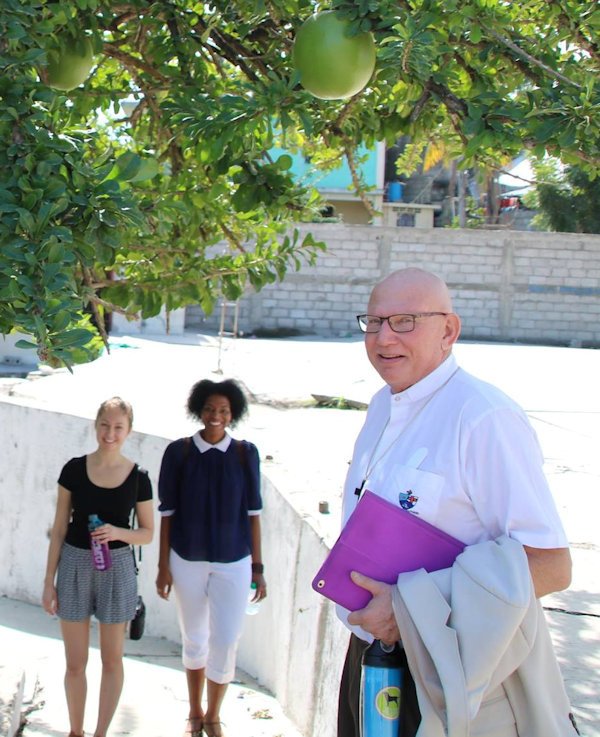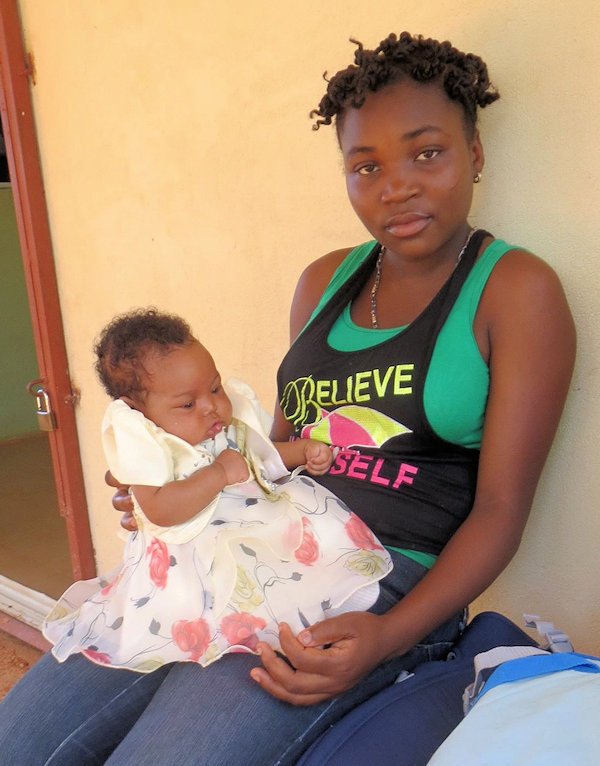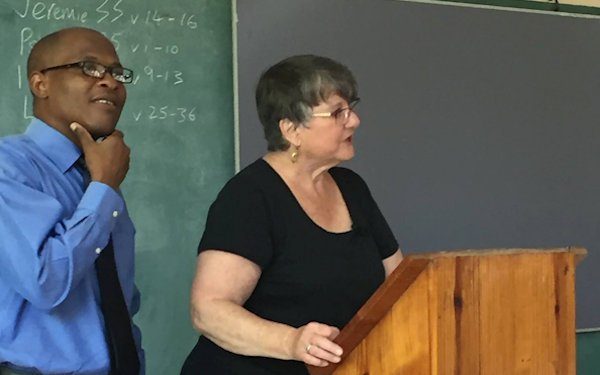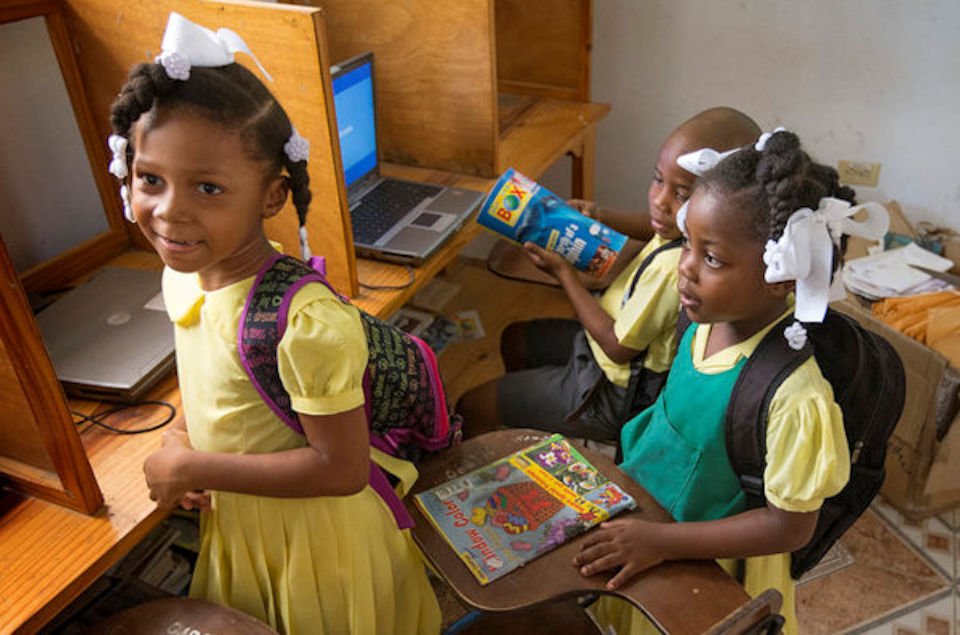The covenant between The Michigan Area and Methodist Church in Haiti is 23 years old. New initiatives for the education of children are being planned by the Haiti Covenant Partners.
KAY DEMOSS
Senior Content Editor, Michigan Conference
It’s been 23 years since the Michigan Area of The United Methodist Church and the Methodist Church in Haiti began a covenant relationship. That original 1996 covenant was renewed in 2014 and now has a new name, “Haiti Covenant Partners.”

The Rev. Karl Zeigler, retired and now active at Detroit: Metropolitan UMC, is the current leader stateside and serves as the liaison between The Michigan Conference and church leaders in Haiti. The Rev. Jean Lesly Dorcely was installed in September 2018 as bishop of the Haitian Church (‘Eglise Methodiste d’Haiti/EMH). Zeigler anticipates working with Dorcely on aspects of the covenant in the months ahead.
From conversations with Bishop Dorcely, Zeigler identifies two priorities. First, development of financial strength of EMH. The denomination wishes to meet its responsibilities for training of pastoral leadership and providing clergy pensions. The second priority of the new bishop is for EMH to become more self-sufficient.
Covenant Partners, of course, can play a role in helping to realize those priorities. The Michigan Covenant Partners are part of a larger network known as The Round Table. The Round Table includes the Church of the Resurrection, Leawood, KS; Highland Park UMC, Dallas, TX; conferences in New York and Pennsylvania; Hearts for Haiti in Indiana and Kentucky; and the Covenant Partners and Jeremie Haiti Project from Michigan.

The Round Table aims to focus on sustainable and transformational efforts rather than the pattern of moving from one project to the next project. “Over the past two-and-a-half years,” Zeigler notes, “we have had fruitful conversations. Before organizations and congregations were doing their own thing rather than talking with each other.” He outlines the priorities of the Round Table: to get clarity and transparency in communication, to strengthen financial accountability, and to discover opportunities for sustainable ministries.
Last month it was announced by the Michigan Conference Board of Global Ministries that the Haiti Hot Lunch Program, a principal program of The Michigan Area for many years, is no longer recognized as an Advance Special. “The Haiti Covenant Partners now plan to establish a new way to provide support for the children and schools of Haiti,” Zeigler reports. A proposal will be sent to The Advance in coming months.
He also shares that there are $175,000 remaining in the Haiti Hot Lunch Fund and discussion is underway on how to distribute those funds. EMH and the General Board are engaged in negotiations on their appropriate use. UMCOR had been assisting EMH in monitoring Haiti Hot Lunch and making necessary reports to The Advance on meals served in 120 schools to 22,000 students. When UMCOR closed its field office in Haiti in 2016, there was no alternative administrative structure in place that could track the program with the detailed annual reporting expected by The Advance.
One major concern at the present time is teacher salaries. Zeigler explains that the larger K-12 schools in Haiti’s cities receive tuition enough to cover all expenses, including teachers’ salaries. “But most elementary schools are in poor, rural villages with little money to pay school fees,” he says. “Teachers only make about $1,000 a year. As we understand it, most teachers are over a year behind in receiving pay.” He estimates there are six to ten teachers in each of 110 schools to be cared for. “Our intent for the annual conference offering is to be able to help some of these teachers stay alive.” Zeigler adds that in 2016 Hurricane Matthew wiped out what few sources of income did exist, only adding to the poverty in the region.
The EngageMI 2019 guidebook continues to list four projects related to Haiti. These are the Advance Specials the Covenant Partners choose to highlight:
- Grace Children’s Hospital and Pediatric Clinic #418520
- Haiti Homeless Children Project #3020507
- Haitian Artisans for Peace International (HAPI) #3020490
- Solar Oven Project #418812
Over the years hundreds of United Methodists from both the West Michigan and Detroit conferences have built significant relationships with congregations and communities in Haiti. EMH has 11 circuits across the island. Michigan Volunteers in Mission have been particularly active in five of them: Cap-Haitien, Petit-Goave, Jeremie, Leon and Port-au-Prince.
Work has included the building of churches, support of schools, medical care, and training and distribution of water filtration systems. At present the United States has banned travel to Haiti by U.S. citizens due to political and social unrest ongoing since last fall. So, for now, Michigan’s Volunteer in Mission work is on hold. This is an economic hardship for Haiti as Zeigler explains, “Money follows the teams,” and when the teams can’t go to Haiti those dollars stay home with them.

One Michigan project, that no longer requires physical presence, left a footprint in Haiti. At the time of covenant renewal in 2014, then EMH leader, Gesner Paul, identified training of preachers as a top priority. A group of 20 Michigan faculty was assembled. These teams staffed four training sessions in Haiti that credentialed 115 local preachers, tripling the number of pastoral leaders for the nation. Haiti Covenant Partners is completing the translation of their teaching materials into Haitian Creole. These lessons will be published in book form to be used in the preparation of future preachers. “It is our plan to have the Haitians select ‘the best’ lectures to be made into digital recordings that will be available on CD and online, as well,” Zeigler adds.
The Michigan Conference has followed the long-standing practice in the Detroit Conference of taking an offering at Annual Conference for Covenant Partners – both those in Haiti and those in Liberia. The Haiti portion of the 2019 ingathering will soon be announced.
Why is Haiti Covenant Partners important? “Because it draws together Michigan people doing mission work in Haiti,” Rev. Zeigler asserts. “Together we can focus on the quality of the whole mission and the sustainability of the whole mission with regard to program and finances. He concludes, “Relationships are critical. Whether or not we bring a substantial number of dollars when we go to Haiti, when we arrive in gives all of us, visitors and Haitians, hope.”
~Note: the offering at the opening worship of the 2019 Michigan Annual Conference on May 30 will be divided 45% to Haiti Covenant Partners, 45% to Liberia Covenant Partners, and 10% to the Michigan Conference Disaster Response and Recovery Fund. Checks should be made payable to the Michigan Conference, noting “AC Offering” in the memo line. An offering will also be taken during the Service of Ordination and Commissioning on Sunday, June 2, for the Ministerial Education Fund. Checks should be made payable to the Michigan Conference with “MEF Offering” in the memo line.
Last Updated on September 20, 2022

